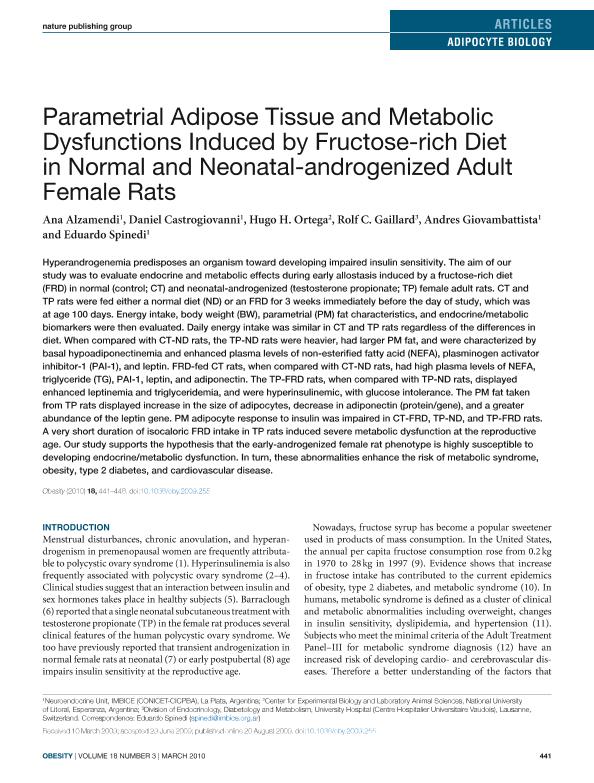Artículo
Fructose rich diet-induced allostasis aggravates metabolic syndrome development in the Polycystic Ovary Syndrome Rat Phenotype
Alzamendi, Ana ; Castrogiovanni, Daniel Cayetano
; Castrogiovanni, Daniel Cayetano ; Ortega, Hugo Hector
; Ortega, Hugo Hector ; Giallard, Rolf; Giovambattista, Andres
; Giallard, Rolf; Giovambattista, Andres ; Spinedi, Eduardo Julio
; Spinedi, Eduardo Julio
 ; Castrogiovanni, Daniel Cayetano
; Castrogiovanni, Daniel Cayetano ; Ortega, Hugo Hector
; Ortega, Hugo Hector ; Giallard, Rolf; Giovambattista, Andres
; Giallard, Rolf; Giovambattista, Andres ; Spinedi, Eduardo Julio
; Spinedi, Eduardo Julio
Fecha de publicación:
12/2010
Editorial:
Nature Publishing Group
Revista:
Obesity
ISSN:
1930-7381
Idioma:
Inglés
Tipo de recurso:
Artículo publicado
Clasificación temática:
Resumen
Hyperandrogenemia predisposes an organism toward developing impaired insulin sensitivity. The aim of our study was to evaluate endocrine and metabolic effects during early allostasis induced by a fructose-rich diet (FRD) in normal (control; CT) and neonatal-androgenized (testosterone propionate; TP) female adult rats. CT and TP rats were fed either a normal diet (ND) or an FRD for 3 weeks immediately before the day of study, which was at age 100 days. Energy intake, body weight (BW), parametrial (PM) fat characteristics, and endocrine/metabolic biomarkers were then evaluated. Daily energy intake was similar in CT and TP rats regardless of the differences in diet. When compared with CT-ND rats, the TP-ND rats were heavier, had larger PM fat, and were characterized by basal hypoadiponectinemia and enhanced plasma levels of non-esterified fatty acid (NEFA), plasminogen activator inhibitor-1 (PAI-1), and leptin. FRD-fed CT rats, when compared with CT-ND rats, had high plasma levels of NEFA, triglyceride (TG), PAI-1, leptin, and adiponectin. The TP-FRD rats, when compared with TP-ND rats, displayed enhanced leptinemia and triglyceridemia, and were hyperinsulinemic, with glucose intolerance. The PM fat taken from TP rats displayed increase in the size of adipocytes, decrease in adiponectin (protein/gene), and a greater abundance of the leptin gene. PM adipocyte response to insulin was impaired in CT-FRD, TP-ND, and TP-FRD rats. A very short duration of isocaloric FRD intake in TP rats induced severe metabolic dysfunction at the reproductive age. Our study supports the hypothesis that the early-androgenized female rat phenotype is highly susceptible to developing endocrine/metabolic dysfunction. In turn, these abnormalities enhance the risk of metabolic syndrome, obesity, type 2 diabetes, and cardiovascular disease.
Archivos asociados
Licencia
Identificadores
Colecciones
Articulos(CCT - SANTA FE)
Articulos de CTRO.CIENTIFICO TECNOL.CONICET - SANTA FE
Articulos de CTRO.CIENTIFICO TECNOL.CONICET - SANTA FE
Citación
Alzamendi, Ana; Castrogiovanni, Daniel Cayetano; Ortega, Hugo Hector; Giallard, Rolf; Giovambattista, Andres; et al.; Fructose rich diet-induced allostasis aggravates metabolic syndrome development in the Polycystic Ovary Syndrome Rat Phenotype; Nature Publishing Group; Obesity; 18; 12-2010; 441-448
Compartir
Altmétricas



